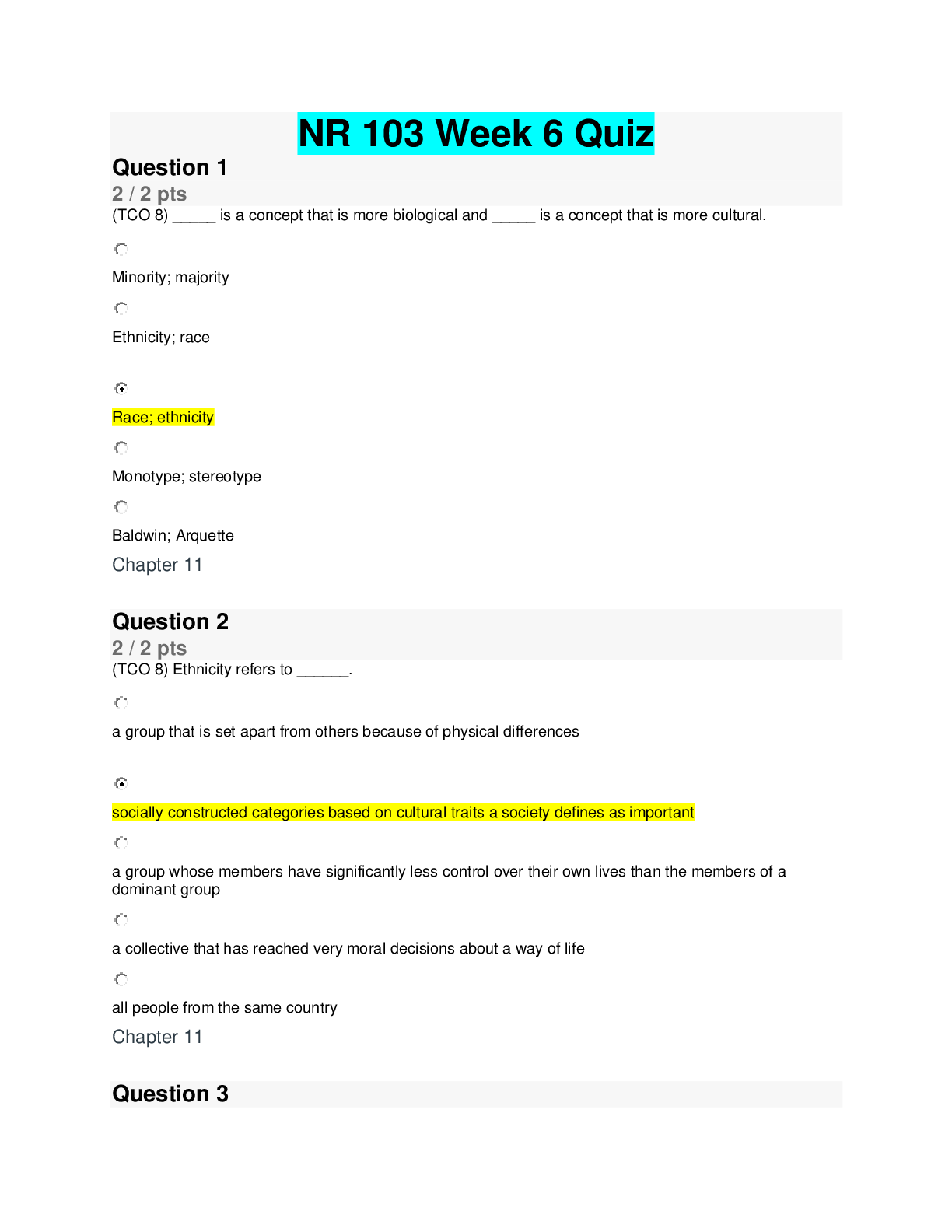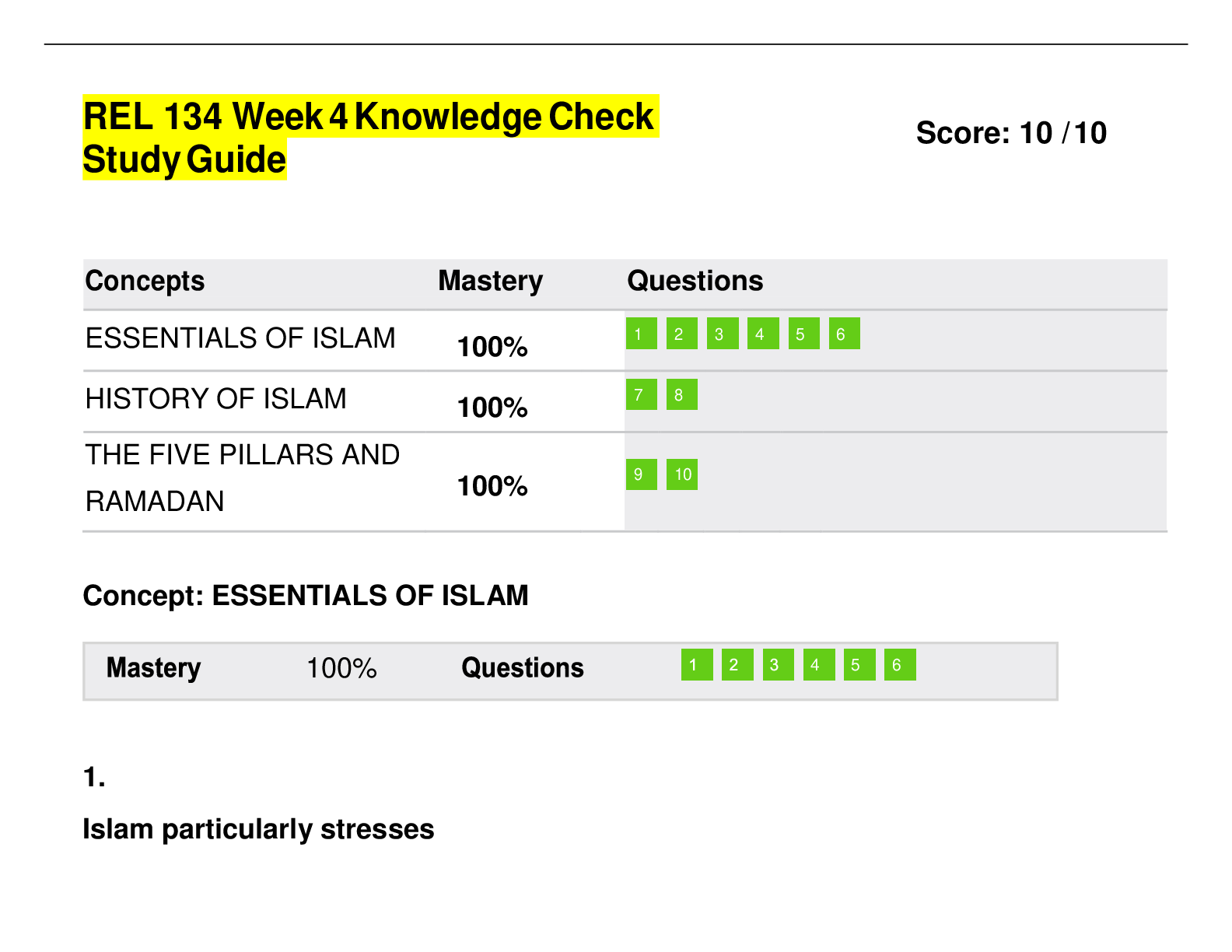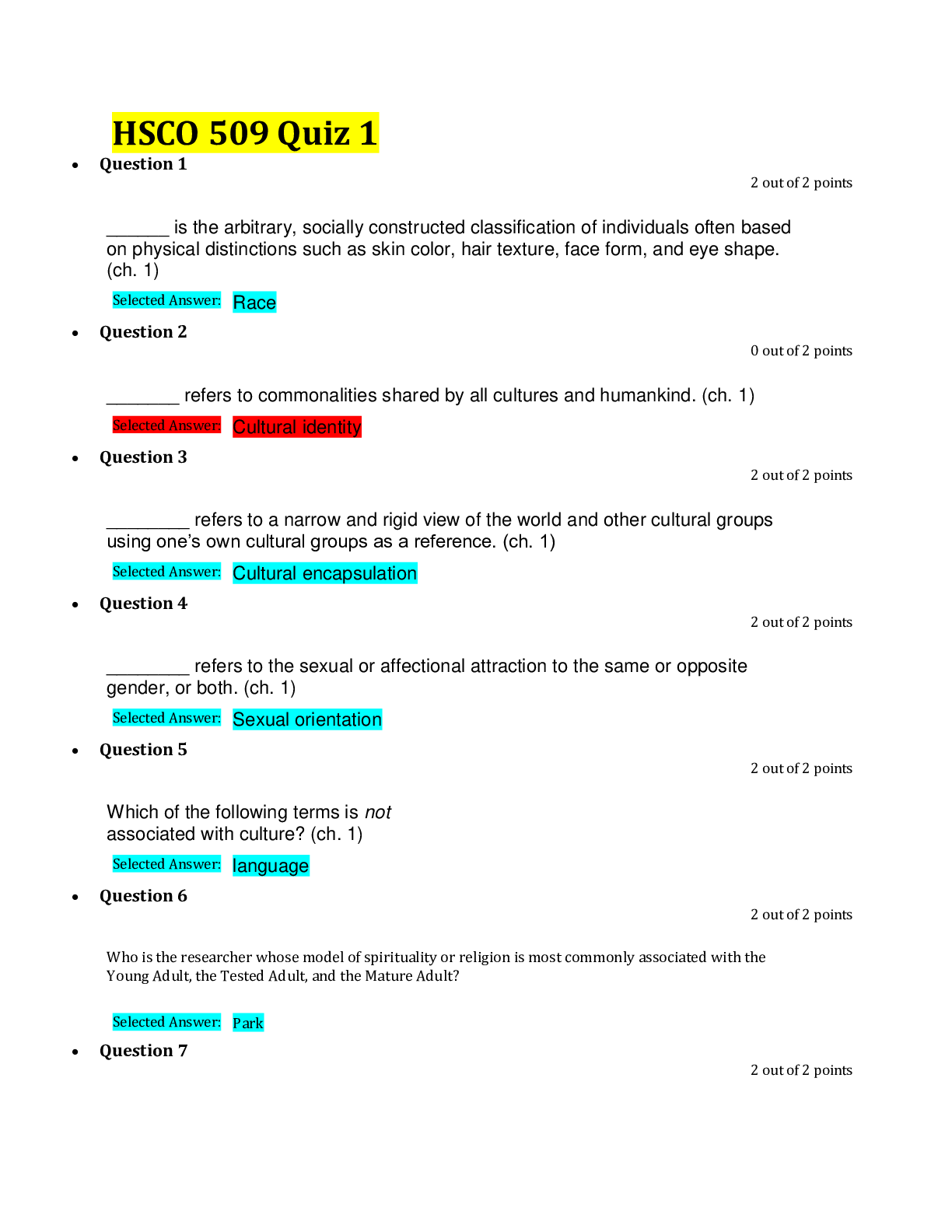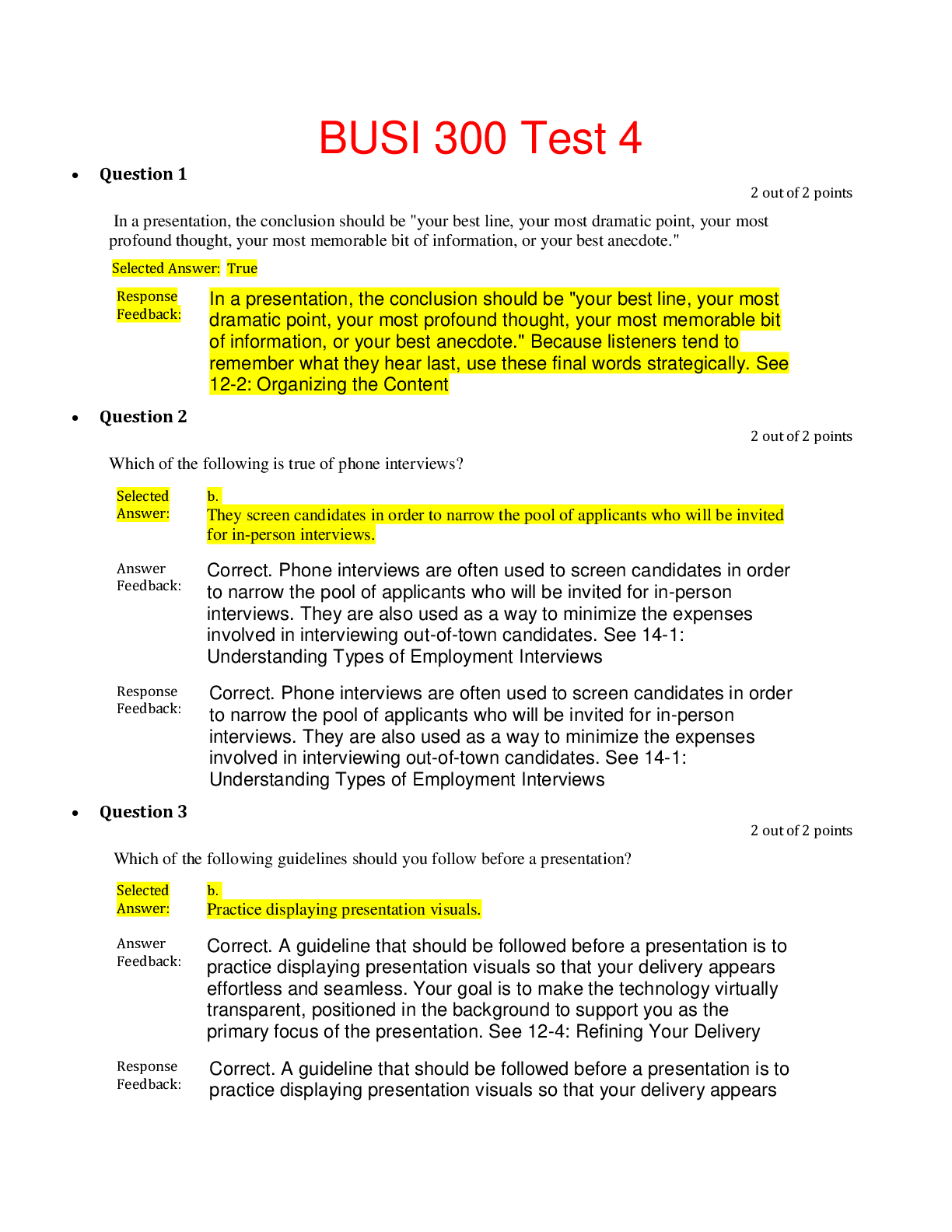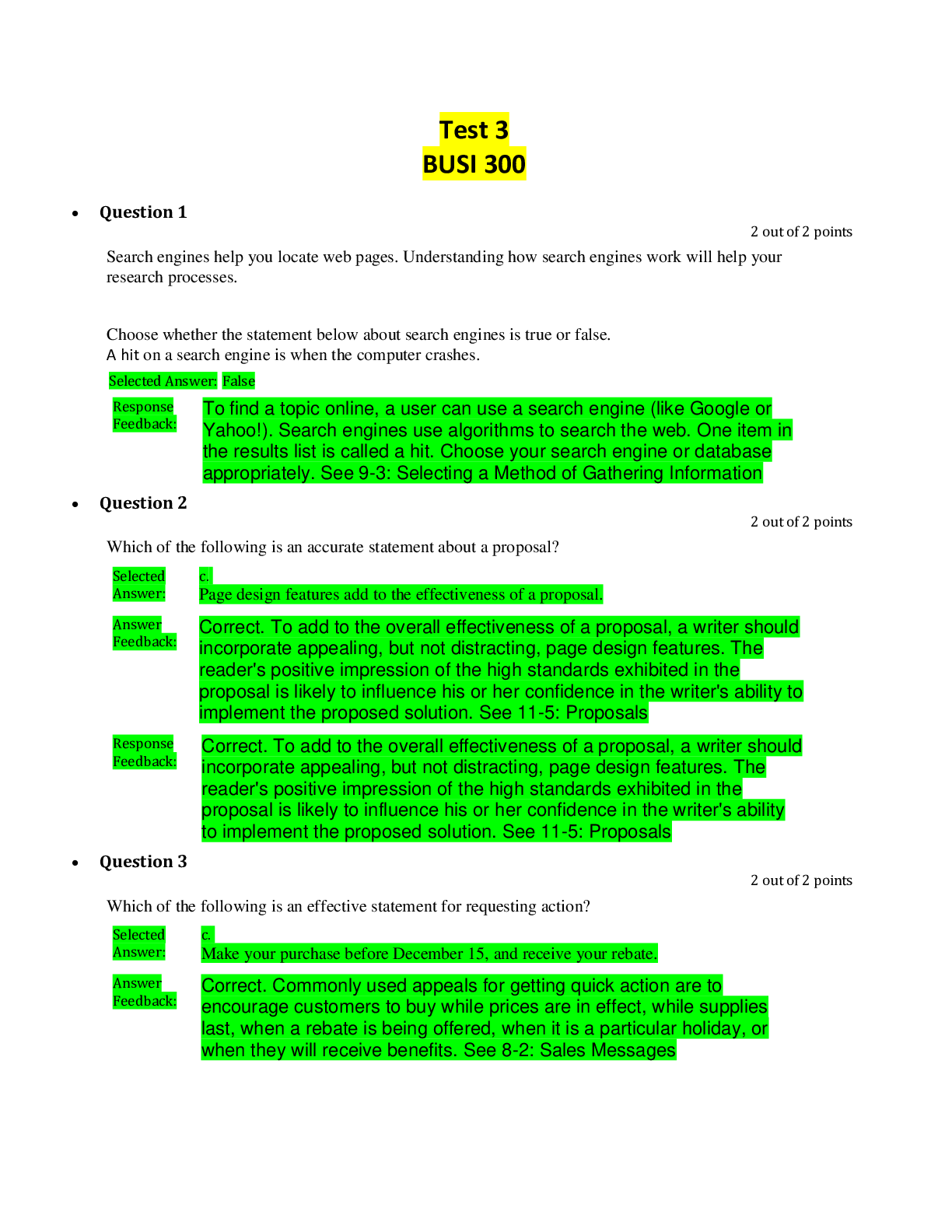NR 505 Week 1 global health training quiz | Complete solution, Latest.
Document Content and Description Below
NR 505 Week 1 global health training quiz. Introduction to Research Ethics quiz Summary Score for this module: 100% 1. The ‘conflict of mission’ in research refers to the potential conflict b... etween: 1. preventing harm to an individual, and 2. gaining scientific k… • True • False 2. Which of the following should not be included as part of the research protocol and submitted to the REC (ERC)? • The budget, including sources of funding • Curricula vitae of the Principal Investigator and the core research team • The information sheet and consent form that potential participants will be asked to sign • A section on the ethical aspects of the protocol, and how the investigators are planning to deal with the ethical issues that may arise • If the protocol has also been reviewed elsewhere, a list of the ethics committee members who reviewed the protocol • A description of how data will be kept confidential and private 3. The Secretariat of an ethics committee can overturn the decision of a committee if they find it unreasonable • True • False 4. Following an animated discussion and after much debate, an REC has decided not to approve a research study that is utilizing a placebo control desi… • Explain the Committee’s rationale, and share the detailed comments made by members of the Committee in order to diffuse the situation and provide a better understanding of the REC functioning • Refuse to enter into any discussion with the PI but invite him to share their views with the REC Secretariat, citing confidentiality as a rationale 5. Ethics committee members should consider the following issues when reviewing a protocol: • have research risks have been minimised? • is appropriate information being provided to participants in a comprehensible way? • are there appropriate provisions to protect privacy and confidentiality? • are the proposed inducements for participants to take part in research appropriate? • all of the above 6. It is often said that 'bad science is unethical'. Please choose the best follow-up sentence. • However, research ethics committees are not qualified to judge the science of a protocol and should therefore not consider the science in their protocol review • However, if the protocol has been reviewed and 'approved' by a scientific or technical committee prior to ethical review, the ethics committee should set aside their doubts as experts have already provided input • Ethics review committees should, therefore, consider the science of the protocol where it has an impact on the ethics of the study • However, this statement is false. Science and ethics are completely separate issues and should never be considered by the same committee. This is supported by all WHO guidance 7. Ethical review is necessary if researchers are to: • ensure that the rights and well-being of research participants and communities are protected • comply with guidance and regulation for research • meet the requirements of some funders and journals • all of the above 8. Research is necessary to: • gain generalizable knowledge which may lead to improvements in health • benefit individual research participants 9. The interests of an individual in research can be overridden in research if it is expected to provide significant benefits to society. • True • False 10. Benchmarks of ethical research include: (select all that apply) • fair selection of study populations • favourable risk/benefit ratios in research • ethical review of protocols by funding agencies • respect for participants and communities 11. Ethics committees should consider the sociocultural, economic and political contexts of research when reviewing protocols • True • False 12. Ethical challenges in research in low and middle income settings include: • research participants may have limited literacy and familiarity with research concepts • limited healthcare services may provide significant incentives for participants to take part in research • local researchers may have limited resources and ability to negotiate with international sponsors to ensure that research protocols are amended to make them appropriate for the local research context. • all of the above Principles and Guidelines Quiz Summary Score for this module: 89% 13. An REC should base its decisions about the research that it reviews on a coherent and consistent application of: • ethical principles in international guidance • human rights instruments • relevant regulations • all of the above 14. Benchmarks for ethical research in low and middle income settings include: (select all that apply) • institutional review • respect for recruited participants • fair selection of study populations • social value • scientific validity 15. An REC should be transparent about the specific ethical guidelines it relies on to make decisions and make these available to researchers and the p… • True • False 16. Research can present difficult dilemmas where reasonable people may disagree and guidance may be inconsistent. In such circumstances committees th… • May find it useful to refer back to the principles and benchmarks of research that underpin the guidance to inform their considerations • Will need to be able to clearly articulate how they have reached a decision and the resources they have relied upon to do so • Should seek to ensure that universal ethical principles have appropriately informed the procedures proposed for the specific research context • All of the above 17. Human rights that are not relevant to research include: • the right to freedom from discrimination • the right to freedom of opinion and expression • the right to employment • the right to equal access to public services and medical care 18. Guidelines for the ethical conduct of research always agree. • True • False 19. The following principles to guide the conduct of ethical research have received widespread acceptance: (select all that apply) • respect for persons • justice Correct answer • beneficence • non-maleficence • informed consent 20. Universal ethical principles can be compatible with procedures to ensure that research is appropriately adapted to the context in which it is condu… • True • False 21. Applications of the principle of respect for persons include: (select all that apply) • the need for voluntary and informed consent • the need to use appropriate study designs • requirements to respect privacy and confidentiality • meaningful community engagement in research Understanding Vulnerability Quiz Summary Score for this module: 93% 22. To determine the impact of pre-natal exposure to alcohol, a research team plans to recruit school-going children studying in grades 2 and 3 of sele… • Reject the protocol and recommend that research into such sensitive issues not be carried out. • Reject the submitted protocol and invite the Principal Investigator to consider alternate ways of collecting the required data and sharing it with teachers and parents, while protecting the interests of the children and their mothers. • Accept the protocol as long as the children themselves are allowed to assent. 23. Which of the following statements are consistent with CIOMS guidance on vulnerable persons? (select all that apply) • Special justification is required for inviting vulnerable persons to serve as research subjects. • If the research can be carried out with non-vulnerable persons, then it should be. • Persons who have serious, potentially disabling or life-threatening diseases are highly vulnerable. • All persons who are vulnerable should not sign consent forms themselves but must have a surrogate or guardian sign to ensure consent is legal. 24. Research participants may be considered vulnerable if they are relatively incapable of protecting their own interests because of a lack of access t… • True • False 25. Examples of vulnerable populations include: • people who can be stigmatised or face legal sanctions in some countries if identified as part of a specific group such as drug users, sex workers and homosexuals • some indigenous and migrant populations • children and others with diminished capacity to give consent to research • prisoners and other institutionalized populations • all of the above 26. A REC is reviewing a protocol seeking to investigate the effectiveness of methods of promoting condom use amongst HIV positive patients in a countr… • what the risks and benefits of the research are • what additional risks this research may pose to potential participants from a vulnerable population • whether the risks of the research are justified by the potential benefits of the research • to what extent the research population is likely to share in the potential benefits of the research • all of the above 27. When seeking a balance between protecting vulnerable populations from harm and protecting populations’ rights to be included in research RECs shoul… • True • False 28. Children are vulnerable participants in research because: (select all that apply) • they typically have to depend on others for their well-being and the protection of their interests • they are typically stigmatized • their physical, mental and emotional development is incomplete • depending on their age, they may not be able to make their own decisions about research participation 29. Special justification is needed if vulnerable participants are to be asked to enrol in research. When enrolling vulnerable research participants: (… • their rights and welfare must be protected • there should be a reasonable likelihood that they will benefit from the results of research • consent should be sought from a proxy who is not vulnerable • the research should be in response to their or their community’s needs and priorities 30. Vulnerability is not created solely by intrinsic conditions (such as a lack of capacity to consent to research), but also by the situations in whic… • poverty • limited access to healthcare • illness • limited educational opportunities • all of the above 31. When reviewing research, RECs should consider what situational aspects of vulnerability can be addressed during research to support informed and vo… • True • False 32. When research with vulnerable populations is proposed RECs may: • seek to minimize the potential for exploitation by recommending alternative research designs • encourage the involvement of community members in all stages of the research • suggest that research staff receive extra training so that they are sensitive to the needs and risks faced by vulnerable participants • request that provisions to ensure confidentiality and privacy receive extra attention • all of the above 33. Criteria for determining whether potential research participants are vulnerable include: (select all that apply) • when they have limited capacity to give informed and voluntary consent • when there are inequalities of rights, powers and resources in a research population • when there is decreased risk of harm to a population • when participants suffer from severe and untreatable illnesses • when there is limited capacity for local ethical review and monitoring of research Correct answer 34. Some populations may not consider themselves to be vulnerable and may find it paternalistic and insulting to be labelled as vulnerable by RECs and … • True • False 35. A PI submits a research project related to the sexual and reproductive health needs of young women (age 18-24) in an impoverished community in Sout… • Women who have a mental disability should be excluded, because they are very vulnerable. • In keeping with local cultural norms, the consent of the husband or father should be obtained before seeking consent from the research participant. • It is not necessary to have a written information sheet and signed consent form in this group, because the women are illiterate, and discussion of sexual and reproductive health in this community is taboo. • Request that women be given the option of being interviewed in their homes (or an alternative private setting that feels safe) rather than in the health facility or researcher’s office, because the women may feel more comfortable in the privacy of their home. Privacy and confidentiality quiz Summary Score for this module: 89% 36. Privacy and confidentiality are the same thing. • True • False 37. Research teams have an obligation to respect research participants’ privacy and maintain the confidentiality of their data. • True • False 38. Limits to the research team’s obligation to preserve confidentiality include situations where information about participants gained during re… • relevant authorities to enable them to limit harm to third parties (such as children) • relevant authorities where there is evidence of participants’ involvement in certain kinds of criminal behaviour • health authorities where there is evidence of notifiable communicable diseases • drug regulatory agencies reviewing applications for marketing authorisation • all of the above 39. When reviewing provisions for the collection and storage of research data, the REC should ensure that: • appropriate codes have been substituted for personal identifiers as soon as is practical • electronic and physical data has been secured and is only accessible to relevant members of the study team • only data that is relevant to answering the research question is being collected • appropriate processes are in place for the destruction of data following research or for the ongoing storage/sharing of the data • all of the above 40. Communities can have differing views about what is private and the extent to which confidentiality should be maintained. • True • False 41. Where research involves the use of focus groups during data collection: (select all that apply) • researchers can guarantee participants that privacy and confidentiality will be maintained • the information sheet and consent form for the study should clearly state the limits to researchers’ abilities to protect privacy and maintain confidentiality Correct answer • the information sheet and consent form should request that members of the focus group to respect the privacy of other focus group participants and maintain confidentiality Correct answer • all of the above Your answer 42. Where relevant, protocols should clearly describe: • what measures will be taken to protect privacy and confidentiality during enrolment in a study, particularly when enrolment will take place in a public setting • additional measures that may be necessary to protect privacy, preserve confidentiality and promote safety when research addresses very sensitive or stigmatizing issues • why it is considered acceptable to use direct peer to peer recruitment (or "snowballing") for a specific study and how confidentiality will be maintained • all of the above 43. In addition to ensuring that confidentiality is maintained, researchers should permit participants to skip questions that they are not comfortable … • True • False 44. When reviewing protocols, RECs should consider whether the following issues relating to maintaining privacy and confidentiality during research hav… • can participants be contacted during research in a way that doesn’t disclose that they are research participants? • have participants taking part in research on a sensitive topic been told that there is a risk that others will know they are taking part in research if they take an information sheet for the study home? • have participants been told that they do not have to answer questions that they would prefer not to? • is only the information necessary to answer the research question being collected? • all of the above Informed consent quiz Summary Score for this module: 100% 45. When assessing provisions for obtaining consent from research participants, RECs should: • review patient information sheets and consent forms for the study • ensure that the process for obtaining consent is thoroughly described in the protocol • ensure that the proposed consent process is appropriate for the research context • all of the above 46. Seeking consent for research is just about getting a signature on a consent form. • True • False 47. Information that should be provided to research participants includes: • the nature and duration of the study and what will be involved in taking part • potential risks and benefits of taking part in research • that research participation is voluntary, and that participants can decline to take part or withdraw from research without penalty • that the privacy of participants and the confidentiality of data will be maintained • all of the above 48. Inducements to take part in research should: • be as great as possible to encourage participation • be as great as possible to maximise benefits and minimise exploitation • be not so low as to be exploitative and not so high as to provide an undue inducement to take part in research • discouraged because they always make participants’ decisions to take part in research involuntary 49. Written consent to research must always be obtained. • True • False 50. A study is being conducted in a culture where it is customary for husbands to make decisions on behalf of their wives and families. The research te… • always just seek consent from a husband for a wife’s participation in research • always just seek consent from the wife for her participation in research • determine with whom the research should be discussed and consent sought in consultation with the communities and families. If the consultation suggests that consent should just be sought from the husband, then the research team should comply with this • seek to involve both the husband and wife in the consent process and for a joint decision to be made. If research is discussed initially with the wife (such as when she is at a health centre) and she requests that her husband is not informed, then this should be respected. 51. Therapeutic misconception refers to: • A research participant’s belief that a research intervention is being offered because it will be beneficial to them • The belief that drug therapy is better than prevention. • A medical practitioner’s belief that the patient is actively engaged in a drug trial. • None of the above. [Show More]
Last updated: 5 months ago
Preview 2 out of 11 pages

Loading document previews ...
Buy this document to get the full access instantly
Instant Download Access after purchase
Buy NowInstant download
We Accept:

Reviews( 0 )
$13.00
Can't find what you want? Try our AI powered Search
Document information
Connected school, study & course
About the document
Uploaded On
Mar 03, 2020
Number of pages
11
Written in
Additional information
This document has been written for:
Uploaded
Mar 03, 2020
Downloads
0
Views
86



